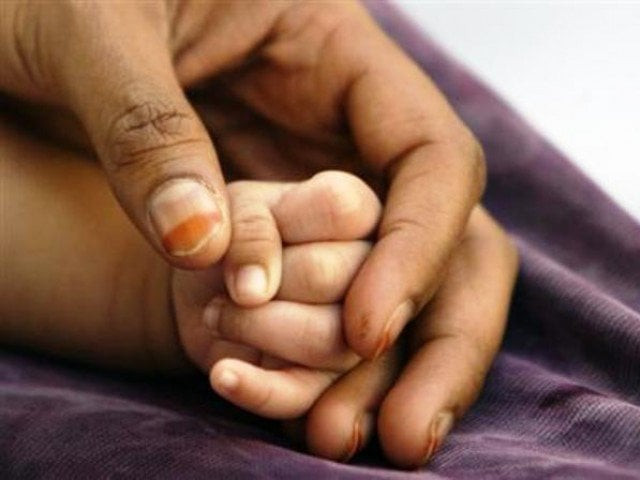K-P rural parents worried about health of their children
Mothers in rural areas more inclined to breastfeed their children than those in cities

Mothers in rural areas more inclined to breastfeed their children than those in cities. PHOTO: FILE
However, the K-P Health Survey 2017 — being claimed as the first such government survey to be conducted in the province in decades —notes that among the 55.5 per cent of people completely immunised against different diseases across K-P, 62 per cent of the children were from the rural areas.
K-P schools losing more children than before
The survey was unveiled on Friday at a local hotel with Minister for Health Shahram Khan Tarakai in the chair.
It found that a majority of women in the province preferred to breastfeed their child. However, of the 59 per cent of mothers who exclusively breastfed their children in K-P, women in rural areas were more inclined to do so at 60 per cent.
The survey found that 88 per cent of mothers in Chitral exclusively breastfed their children. By comparison, the southern district of Lakki Marwat had the lowest figure of 27 per cent. Peshawar was in the middle of the median with 48 per cent of mothers breastfeeding their children.
However, the survey found that few women breastfed their children in the hour after delivery with only 20 per cent of mothers opting to do so. Around 20 per cent of such women were in the rural areas and while 19 per cent in urban areas.
Chitral unsurprisingly was at the top with 69 per cent. Swat, though, was at the bottom with only one per cent.
The province though did record a growing trend of breastfeeding, at least for the first six months, with figures rising from 44.7 per cent to 59.3 per cent in 2017.
The detailed survey showed that more and more mothers were opting to have their babies delivered at health facilities with only 32.4 per cent of deliveries being conducted at home. This is down from 69.5 per cent in 2006-7 and 59.3 per cent in 2012-13.
The survey found that 30.6 per cent of deliveries were reported to have taken place at public health facilities, while 36.9 per cent took place at private hospitals
Moreover, it found that husbands, more than any other member of the family, even the mother-to-be has a say in determining where the delivery will take place with 52 out of 100 husbands in the urban areas and 47 out of 100 husbands in the rural areas deciding the venue for delivery.
Mother-in-laws had a say in 19 out of 100 deliveries in urban areas. However, it seems that mother-in-laws in the rural areas have more of a say, deciding venues of 24 out of 100 deliveries in rural areas.
Pregnant women themselves had a say on where 26 per cent of deliveries will take place. This figure was same for rural and urban areas.
According to the health officials, the government has allocated 11 per cent of the annual provincial budget for upgrading health facilities. Moreover, the government has tried to ensure that health staffers are present at 95 per cent of health facilities across the province.
“In 2006-7, there were 37.9 per cent cases were skilled attendants assisted deliveries. But the situation has since improved with the survey discovering that skilled attendants handled 72.2 per cent of deliveries,” officials said.
Karak had the highest number of babies delivered by skilled attendants at 87 per cent, Peshawar was close behind with 85 per cent. Kohistan had to lowest ratio with 14 per cent.
Tarakai noted that the survey details progress made in the province over the past five years.
Terming the figures to be encouraging, he added that recent steps taken by Pakistan Tehreek-e-Insaf (PTI) government will further improve the situation in the coming years.
69,389 children remain unvaccinated in K-P
“It [the survey] has never happened in the past. Since we brought issues into the spotlight, the government was committed to invest in and support health and education sectors so that the coming generations do not have to face problems,” the health minister asserted.
He stated that previous governments had basically outsourced the Basic Health Units (BHU) in the province.
However, Tarakai claimed, the PTI had upgraded and equipped the units.
“I can see achievements in the survey but this is not the end, rather efforts will continue for improving things until the next survey.”
He also stated that once educated, mothers would know about the importance of exclusive breastfeeding, immunisation and would ultimately lead to reducing diseases posing serious threats to children.
Published in The Express Tribune, December 9th, 2017.



















COMMENTS
Comments are moderated and generally will be posted if they are on-topic and not abusive.
For more information, please see our Comments FAQ